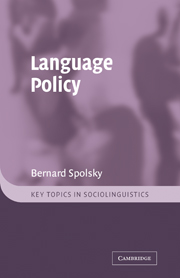Book contents
- Frontmatter
- Contents
- List of tables
- Preface
- 1 Language practices, ideology and beliefs, and management and planning
- 2 Driving out the bad
- 3 Pursuing the good and dealing with the new
- 4 The nature of language policy and its domains
- 5 Two monolingual polities – Iceland and France
- 6 How English spread
- 7 Does the US have a language policy or just civil rights?
- 8 Language rights
- 9 Monolingual polities under pressure
- 10 Monolingual polities with recognized linguistic minorities
- 11 Partitioning language space – two, three, many
- 12 Resisting language shift
- 13 Conclusions
- References
- Index
8 - Language rights
Published online by Cambridge University Press: 22 December 2009
- Frontmatter
- Contents
- List of tables
- Preface
- 1 Language practices, ideology and beliefs, and management and planning
- 2 Driving out the bad
- 3 Pursuing the good and dealing with the new
- 4 The nature of language policy and its domains
- 5 Two monolingual polities – Iceland and France
- 6 How English spread
- 7 Does the US have a language policy or just civil rights?
- 8 Language rights
- 9 Monolingual polities under pressure
- 10 Monolingual polities with recognized linguistic minorities
- 11 Partitioning language space – two, three, many
- 12 Resisting language shift
- 13 Conclusions
- References
- Index
Summary
THE RIGHTS OF LINGUISTIC MINORITIES
With all its complexity, the language policy of the United States revealed an overarching monolingualism (the hegemony of a single national if not official language), with the large number of speakers of minority languages protected by language rights, or more precisely, by the application of civil rights to language, which emerged largely from the interpretation of courts, legislators and bureaucrats of constitutionally protected civil rights for minorities, as part of the understanding of the fourteenth Amendment and Title VI of the Civil Rights Act.
Many countries of the world have a similar “monolingual but …” policy. They may name in their constitution or in their laws a single national or official language, but then modify the intolerance by proclaiming protection for one or more minority languages. Even in France, there are occasional signs of attention to the rights of speakers of previously ignored regional languages. This chapter will trace the development and current state of minority language rights, a common factor in much contemporary discussion of language policy.
There are difficulties with the term “minority”. The numerical implication of the term is not always appropriate, the relationship in fact generally being superordinate or subordinate status (Paulston 1998). Some ethnic minorities, Paulston pointed out, can be dominant (e.g. English-speakers in South Africa), and others (e.g. Christians in Lebanon) are not primarily linguistically different. The term must therefore be used with care.
- Type
- Chapter
- Information
- Language Policy , pp. 113 - 132Publisher: Cambridge University PressPrint publication year: 2003



